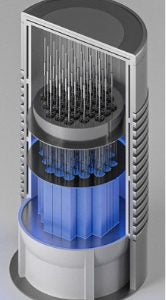UK Business Secretary Greg Clark said on 27 June that the UK government was committed to underwrite the collaborative Joint European Torus (JET) nuclear fusion project with the European Union (EU) until 2020 as long as the EU extends the contract to host the facility beyond 2018.
“A discussion will then take place on the appropriate funding split,” the government said. Clark added that JET “is a prized facility at the centre of the UK’s global leadership in nuclear fusion research, which is why the government is taking every possible step to secure its future and to maintain highly-skilled jobs in the UK”.
The UK decision to leave Euratom when it leaves the EU has raised concerns future funding of JET and other collaborative nuclear research projects. JET, located at the Culham Centre for Fusion Energy, near Oxford, is considered to be the ‘little brother’ to the International Thermonuclear Experimental Reactor (Iter) project, based in France. It is used by more than 40 European laboratories and is the only operational fusion experiment able to produce fusion energy. The project involves about 500 people including 350 European scientists conducting research.
Under the current funding arrangements, the EU provides around €68m ($77m) a year, comprising some 88% of JET’s running costs. The contract to maintain and operate JET is managed by the UK Atomic Energy Authority (UKAEA). It is due to end in December 2018.
Science Minister Jo Johnson said: "Our exit from the EU has not altered our desire and willingness for the UK to continue playing a leading role in furthering our scientific understanding.” UKAEA CEO Professor Ian Chapman welcomed the government's commitment.






